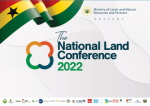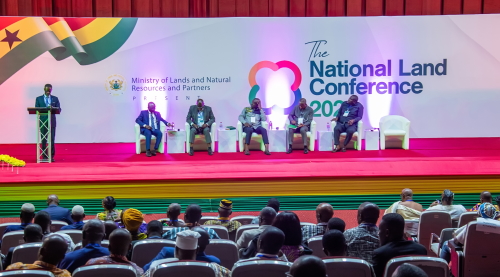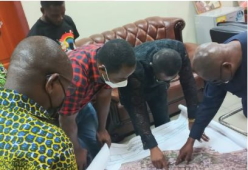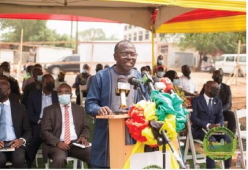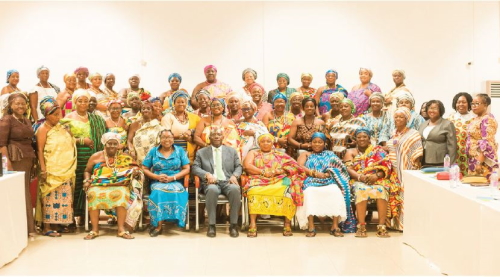News in 2022

|
The National Land Conference 2022, Ghana
6-9 December 2022, Accra, Ghana
FIG partners the Ministry of Lands and Natural Recources, the Lands
Commission and Civil Society Organization for the Maiden Lands
Conference in Accra, Ghana.
A four-day conference on land was held in Accra Ghana from the 6th to
9th December 2022 to highlight the implementation of the recently
promulgated laws on land management and physical planning for
sustainable development. The land act 2020, act 1036 and Land Use and
Spatial Planning Act 2016, act 926 were brought into focus. The theme
was “Ghana’s Land Administration Regime: Leveraging Policy, Legislation
and Institutional Capacity Towards Sector Transformation for Sustainable
Economic Development.
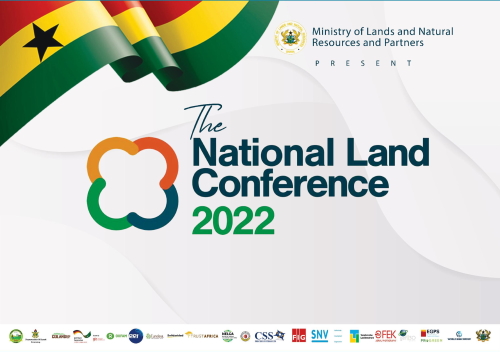 |
The conference was formally opened by Ghana’s President His
Excellency Nana Addo Dankwa Akufo Addo and supported by key Ministers of
state, Members of Parliament Traditional Leaders from across the
country, and representatives of the World Bank, GiZ of Germany, SNV of
Netherlands and other local and foreign development partners. FIG was
represented by Vice President Kwame Tenadu Snr. The conference brought
together an average of 560 participants each day, both local and foreign
with online guests. It had four policy dialogue sessions paneled by
distinguished policy analysts, researchers and academics and in addition
several relevant technical sessions with presentations from
knowledgeable persons. The occasion was also spiced with cultural
displays at the opening and closing sessions.
Leading towards FIG Working Week 2024
The 2022 National Land Conference in Ghana marks an important
milestone in the roadmap towards establishing a transformed land
administration system. The conference created a platform for
deliberating on the current and emerging land related issues and
chartered a new course for land governance and land administration.
As outcome of the conference, a communiqué was formulated.
Communiqué
FIG Vice President Kwame Tenadu was engaged in the week preceding and
days after the conference as the final report was presented to the
Ministry and Presidency.
Ghana land conference
programme and information
This conference was an important kick-off also for the FIG Working
Week 2024 that will take place in Accra Ghana.
OVERVIEW
The first national land policy formulation process in Ghana started
with the receipt by Government in March 1994 of the Final Report of the
Law Reform Commission, which started work on Proposals for the Reform of
Land Law in 1973. Between 1994 and 1997, the Final report was subjected
to a series of reviews and wide stakeholder consultations to identify
policy options for consideration by the Ministry. A draft policy
document was discussed at a National Land Policy Workshop in April 1997.
The final draft policy document was presented to Cabinet in December
1997 for consideration and approval, and received final government
approval in January 1999. The policy document was launched in June 1999.
The National Land Policy identifies several land administration
challenges and their resolution of which are considered fundamental in
realizing an efficient and effective land tenure regime in Ghana.
The challenges include weak land administration and management systems,
multiple land sales, compulsory acquisition by government of large
tracts of land unutilized and compensation unpaid, land market
indiscipline, unauthorized occupation and use of state lands by
encroachers, haphazard spatial developments, lack of adequate functional
and coordinated geographic information systems and networks,
indeterminate boundaries of customary owned lands, lack of modern and
up-to-date maps and plans, and use of unapproved development schemes.
Successive Governments have sought, through numerous initiatives to
improve Ghana’s land administration regime. The major interventions in
land administration have been through the Land Administration Project
(LAP) - phases 1 and 2, which sought to lay the foundation and
consolidate urban and rural land administration and management systems
for efficient and transparent land service delivery. Broadly, the
interventions under LAP achieved the following main gains:
- establishing the “new” Lands Commission in 2008 (through the
passage of the Lands Commission Act, 2008, Act 767),
- drafting of a new Land Bill, which was passed by Parliament as
the Land Act, 2020 (Act 1036) and assented to by the President on
23rd December 2020,
- supporting the Judiciary by funding the establishment of a
number of specialized Land Courts and improving the operations of
the courts through automation,
- introduction of a new three-tier Spatial Planning Model,
- enacting the Land Use and Spatial Planning Act, 2016 (Act 925)
establishing the new Land Use and Spatial Planning Authority,
- preparing a National Spatial Development Framework and two (2)
Regional Spatial Development Frameworks,
- funding street naming and house numbering in towns and cities,
- establishing five (5) Client Service Access Units (CSAUs) within
the Lands Commission,
- developing a Geospatial Policy for Ghana,
- establishing 87 Customary Land Secretariats nationwide,
- constructing a modern office complex for Land Sector agencies in
Kumasi,
- decentralizing deed registration to all the regional capitals
- ensuring participation of non-state actors such as the Civil
Society Coalition on Land (CICOL) and other NGOs in land sector
among others.
In addition to the State efforts, several independent programs aimed
at contributing to addressing the challenges in Ghana’s land sector have
been implemented by non-state actors. These have produced some results
that have contributed to improvements in the land sector. Examples
include projects implemented by several NGOs such as Solidaridad, GiZ,
USAID, RRI, COLANDEF, as well as some private sector actors. These
include the collaboration with stakeholders in the development of a
Handbook for Customary Land Rights Documentation, piloting of customary
land rights documentation, organization of an Africa Regional
Consultative Workshop on Securing Land Tenure in Africa, analysis of
land access and tenure security for the several agricultural value
chains, development of Guidelines for Responsible Land Based Investments
for the Private Sector, Community and Public Sector actors, Analysis of
the Social Inclusion Dimensions of Large Scale Land Acquisition, among
many others.
Even though the Land Administration reforms has focused on reforming the
legal regulatory and institutional frameworks, decentralization of
service delivery, testing new methods and approaches through piloting
and seeking to harmonize the customary and formal systems of land
administration, there is worsening land tenure risks for urban,
peri-urban, and rural land users, fueled on the one hand by the rapid
population growth and urbanization, increasing demand for land for all
human activities and on the other hand by lack of coordination among
many public sector institutions, uncoordinated land use practices, and
lack of participation and inclusiveness in land governance and land
administration. This indicates the urgent need for a more inclusive,
strategic, and sustained multi-stakeholder approach to improve the
governance of land in the country. Dialogue spaces among national and
local governments, industry players, customary landowners and actors,
academia, civil society organizations, investors and the general public
are needed to achieve sustainable land sector transformation and
socio-economic development.
Thus, the National Land Conference 2022 is designed to build on all
these efforts in the land sector by both state and non-state actors and
institutionalize a structured arrangement for multi stakeholder
participation in the transformation of the land sector.
RATIONALE FOR THE NATIONAL LAND CONFERENCE
Significant land administration challenges still remain unattended to
in the country. Additionally, since the National Policy Workshop was
held in 1997 to review the revised draft policy document, there has not
been any major national conference to critically consider emerging land
issues resulting from environmental pressures, population dynamics, use
and misuse of resources, reorganization of national, regional, local and
traditional agencies, and advancements in technology among others.
There has been calls for deeper review of the current state of the
land administration system and critically review the various
interventions (Policies, Legislative, Institutional and Regulatory
frameworks) in the land sector with a view to charting a new direction
for the land sector.
The 2022 National Land Conference provides a good platform for
undertaking a deeper introspection of the current state of Ghana’s land
sector, identify opportunities and generate multi-stakeholder support
for sustainable reforms.
Kwame Tenadu
December 2022























